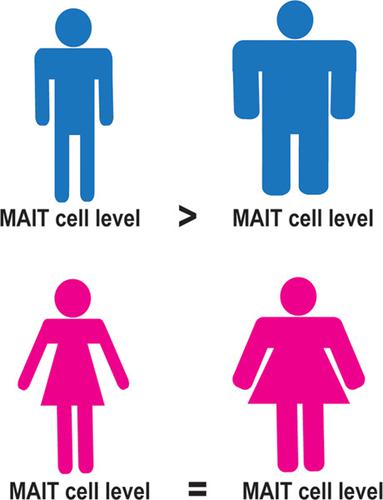当前位置:
X-MOL 学术
›
Immun. Inflamm. Dis.
›
论文详情
Our official English website, www.x-mol.net, welcomes your feedback! (Note: you will need to create a separate account there.)
Sex discrepancy in the reduction of mucosal‐associated invariant T cells caused by obesity
Immunity, Inflammation and Disease ( IF 2.493 ) Pub Date : 2020-12-17 , DOI: 10.1002/iid3.393 Jianyun Liu 1 , Hongmei Nan 2, 3 , Randy R Brutkiewicz 1 , Jose Casasnovas 4 , Kok Lim Kua 4
Immunity, Inflammation and Disease ( IF 2.493 ) Pub Date : 2020-12-17 , DOI: 10.1002/iid3.393 Jianyun Liu 1 , Hongmei Nan 2, 3 , Randy R Brutkiewicz 1 , Jose Casasnovas 4 , Kok Lim Kua 4
Affiliation

|
Gut microbiota has been reported to contribute to obesity and the pathology of obesity‐related diseases but the underlying mechanisms are largely unknown. Mucosal‐associated invariant T (MAIT) cells are a unique subpopulation of T cells characterized by the expression of a semi‐invariant T cell receptor (TCR) α chain (Vα19 in mice; Vα7.2 in humans). The expansion and maturation of MAIT cells require the gut microbiota and antigen‐presenting molecule MR1, suggesting that MAIT cells may play a unique role in bridging gut microbiota, obesity, and obesity‐associated inflammation.
中文翻译:

肥胖引起的黏膜相关不变 T 细胞减少的性别差异
据报道,肠道微生物群会导致肥胖和肥胖相关疾病的病理学,但其潜在机制在很大程度上是未知的。黏膜相关不变 T (MAIT) 细胞是一种独特的 T 细胞亚群,其特征是表达半不变 T 细胞受体 (TCR) α 链(小鼠为 Vα19;人类为 Vα7.2)。MAIT 细胞的扩增和成熟需要肠道菌群和抗原呈递分子 MR1,这表明 MAIT 细胞可能在弥合肠道菌群、肥胖和肥胖相关炎症方面发挥独特作用。
更新日期:2021-02-04
中文翻译:

肥胖引起的黏膜相关不变 T 细胞减少的性别差异
据报道,肠道微生物群会导致肥胖和肥胖相关疾病的病理学,但其潜在机制在很大程度上是未知的。黏膜相关不变 T (MAIT) 细胞是一种独特的 T 细胞亚群,其特征是表达半不变 T 细胞受体 (TCR) α 链(小鼠为 Vα19;人类为 Vα7.2)。MAIT 细胞的扩增和成熟需要肠道菌群和抗原呈递分子 MR1,这表明 MAIT 细胞可能在弥合肠道菌群、肥胖和肥胖相关炎症方面发挥独特作用。



























 京公网安备 11010802027423号
京公网安备 11010802027423号